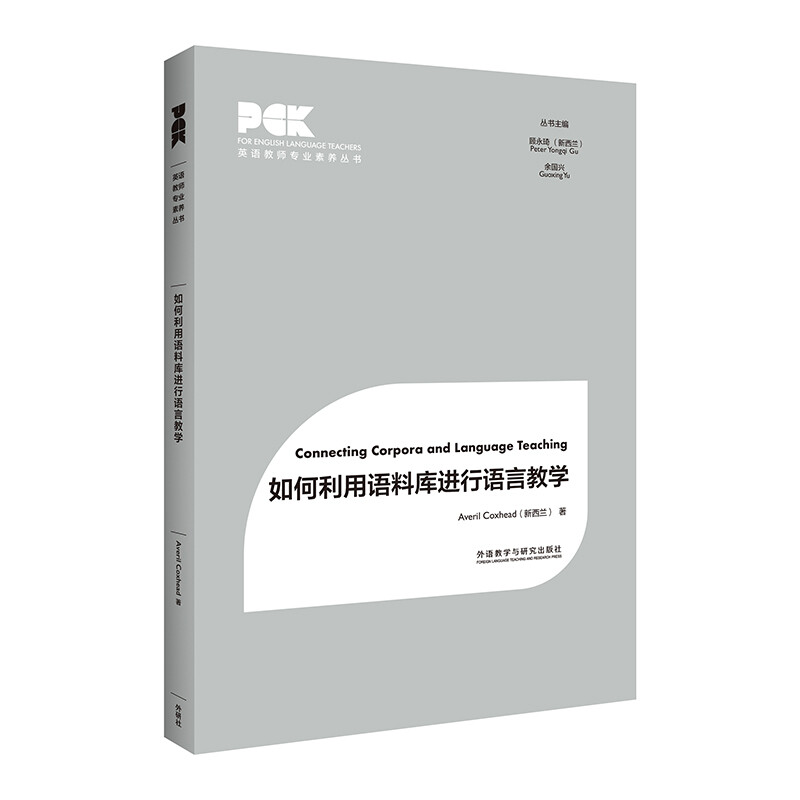
如何利用语料库进行语言教学(英语教师专业素养丛书)

- ISBN:9787521334524
- 装帧:一般胶版纸
- 册数:暂无
- 重量:暂无
- 开本:16开
- 页数:244
- 出版时间:2022-04-01
- 条形码:9787521334524 ; 978-7-5213-3452-4
本书特色
适读人群 :学生,教师,一般读者1. 英语教师利用语料库进行课堂词汇教学的一站式指南。 2. 理论全面:不仅系统阐明语料库的概念,还具体说明语料库与单个单词、多词单位、学术英语和专业英语之间的联系。 3. 注重实践:以具体案例和课堂活动说明如何利用语料库进行课堂教学。 4. 考虑研究需求:指导教师如何进行基于语料库的研究。 5. 附录丰富实用:附有相关网站、语料库名称和网址、基于语料库开发的测试以及拓展阅读书目。 6. 语言简明,浅显易懂。
内容简介
本书“英语教师专业素养丛书”的一本,是英语教师利用语料库进行课堂词汇教学的一站式指南。作为语料库与词汇教学领域的非常不错学者,考克斯黑德教授在书中先介绍语料库的概念,再阐明语料库与单个单词、多词单位、学术英语和专业英语之间的联系,随后具体说明如何利用语料库进行课堂词汇教学,以及如何基于语料库做研究。为方便英语教学实践,书中介绍了大量案例、任务、在线资源、分析工具以及具体操作步骤;为方便读者,书后附有相关网站、语料库名称和网址、基于语料库开发的测试以及拓展阅读书目。本书极具实操性,可有效指导教学实践。
目录
1. Introduction 3
2. What is a corpus? 3
3. What kinds of corpora are there? 4
4. What corpora might be available for teachers and researchers to access? 19
5. Why might a corpus be useful for language teaching and what might be some of the challenges? 21
6. Summary 22
7. What could teachers do after reading this chapter? 23
8. References 23
Chapter 2 Connecting corpora and single words
1. Introduction 31
2. Corpora and word frequency in English 31
3. Measuring the vocabulary load of a spoken text 46
4. Vocabulary load and written texts 50
5. Summary 52
6. What could teachers do after reading this chapter? 52
7. References 53
Chapter 3 Connecting corpora and multi-word units
1. Introduction 59
2. What are multi-word units? 59
3. Classifying multi-word units 62
4. Some examples of multi-word unit lists of general English 69
5. Regional variations in multi-word units 73
6. Using corpora to identify multi-word units in a text 73
7. The Phrasal Expressions List (PHRASE List)(Martinez & Schmitt, 2012) 76
8. Summary 79
9. What could teachers do after reading this chapter? 80
10. References 80
Chapter 4 Connecting corpora and English for Academic Purposes
1. Introduction on 87
2. What is English for Academic Purposes and why is it important? 87
3. English for General Academic Purposes 88
4. Using corpora to examine vocabulary in the sciences 102
5. Corpus-based multi-word unit lists for EAP 108
6. Idioms in academic texts 115
7. Summary 115
8. What could teachers do after reading this chapter? 116
9. References 116
Chapter 5 Connecting corpora and English for Specific Purposes
1. Introduction 123
2. What is special about vocabulary in English for Specific Purposes? 123
3. Frequency in vocabulary in ESP 126
4. How can corpora help in teaching and learning technical or specialised vocabulary in ESP? 131
5. Multi-word units in ESP 140
6. Summary 143
7. What could teachers do after reading this chapter? 143
8. References 143
Chapter 6 Taking corpora into classrooms
1. Introduction 151
2. The four strands (Nation, 2007) and planning using word lists 152
3. Using corpora in the classroom for strategy training 163
4. Using corpora in the classroom for testing 168
5. Using corpora for teaching 173
6. Summary 178
7. What could teachers do after reading this chapter? 179
8. References 179
Chapter 7 Designing and evaluating corpus-based research for the classroom and carrying out your own study
1. Introduction 187
2. What methodological decisions and principles might need to be made when you consider designing or using a corpus? 187
3. Evaluating a word list made from a corpus 197
4. Evaluating corpus-based research 201
5. Carrying out your own corpus-based study 203
6. Summary 204
7. What could teachers do after reading this chapter? 204
8. References 205
Chapter 8 Websites, corpora, tests and suggestions for further reading and conclusion
1. Introduction 211
2. Suggestions for useful websites and tools for carrying out corpus analysis 211
3. Some corpora that are available online 212
4. Some tests developed from corpora for general English 213
5. Suggestions for further reading 214
6. Some suggestions for journals on corpus-based research and classroom teaching 217
7. Conclusion 218
8. What could teachers do after reading this chapter? 219
9. References 219
Appendices 221
Answer keys 233
Glossary 241
作者简介
埃夫丽尔·考克斯黑德(Averil Coxhead)教授在新西兰惠灵顿维多利亚大学语言学与应用语言研究学院任教,为本科生和研究生讲授应用语言学与作为外语的英语课程;其研究领域包括专业英语词汇、学术英语词汇、利用语料库进行词汇学习与教学,以及词汇教学法。
-

蛤蟆先生去看心理医生
¥26.6¥38.0 -

咬文嚼字二百问
¥9.6¥32.0 -

世界尽头的咖啡馆
¥18.0¥45.0 -

字海探源
¥25.0¥78.0 -

从零开始的女性主义
¥30.3¥52.0 -

乡土中国
¥14.6¥26.0 -

与内心的恐惧对话:摆脱来自亲人的负能量
¥34.1¥48.0 -

《标点符号用法》解读
¥6.2¥15.0 -

中国人的精神
¥9.9¥29.0 -

社会学:原来这么有趣有用
¥9.1¥36.0 -

你能写出好故事-写作的诀窍.大脑的奥秘.认知的陷阱
¥9.8¥32.8 -

焦虑心理学:不畏惧、不逃避,和压力做朋友
¥11.4¥38.0 -

乌合之众:大众心理研究
¥12.1¥36.8 -

理解生命
¥10.5¥32.8 -

从白大褂到病号服:探索医疗中的人性落差
¥12.7¥39.8 -

非暴力沟通心理学 : 用非暴力沟通化解冲突
¥9.0¥36.0 -

上大演讲录(1922-1927卷)(九品)
¥14.0¥52.0 -

那时的大学
¥8.4¥28.0 -

乌合之众:群体心理研究
¥11.9¥39.8 -

始于极限:女性主义往复书简(八品)
¥22.4¥59.0












